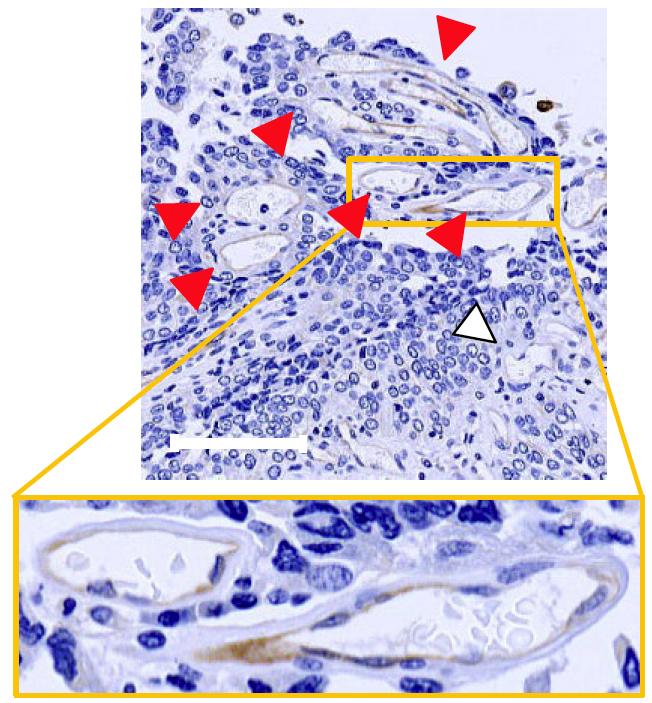Cancer cells make blood vessels drug resistant during chemotherapy

ABCB1-positive blood vessels (brown) after first-line chemotherapy in human urothelial carcinoma. Red and white arrowheads indicate ABCB1-positive and negative blood vessels, respectively. (Kikuchi H., et al., Cancer Research, June 15, 2020) Credit: Kikuchi H., et al., Cancer Research, June 15, 2020 Usage Restrictions: This image is copyrighted and can be used for reporting this research work without obtaining a permission if credited as instructed.
Chemotherapy is often chosen for treating inoperable cancers, such as locally advanced and metastasis cases. It is, therefore, essential to unravel drug-resistance in this treatment, which has been a major factor in making cancer malignant and causing metastasis.
Tumor blood vessels play a key role in cancer progression because they carry nutrients and oxygen to tumors and serve as pathways for metastasis. It had been generally believed that tumor endothelial cells (TEC) lining tumor blood vessels did not acquire drug-resistance.
However, several years ago, the group's mice experiments showed TEC can obtain various anomalies, suggesting blood vessels, as well as cancer cells, can contribute to making tumors drug-resistant.
For example, the group demonstrated for the first time that TEC in blood vessels resist paclitaxel – a chemotherapy medication used for second-line treatment of urothelial cancer – due to the expression of ABCB1 which pumps out the drug from blood vessels.
However, much remains unknown about how human blood vessels are involved in cancer acquiring drug-resistance.
To help unravel this mystery, the group first analyzed tumor tissue samples from urothelial cancer patients before and after they underwent first-line chemotherapy.
They found ABCB1 expression was increased in TEC in blood vessels of more than 60 percent of patients who received chemotherapy, and that their prognoses were poorer than patients whose ABCB1 expression remained the same after the treatment.
In addition, they analyzed TEC in blood vessels and bladder cancer cells to study how chemotherapy affects ABCB1 expression. The results showed that the increased secretion of interleukin-8 (IL-8) in cancer cells after chemotherapy caused inflammatory changes, increasing the ABCB1 expression in TEC.
In another experiment, mice with urothelial cancer administered with the ABCB1 inhibitor together with paclitaxel showed suppressed formation of new blood vessels and thus metastasis to the lung.
“Our study provides evidence, for the first time in humans, that inflammatory changes in tumors can cause drug resistance in cancer blood vessels,” says Kyoko Hida of Hokkaido University who led the group. “These findings could help devise new treatment strategies, such as the development of inhibitors targeting ABCB1 and IL-8, to suppress drug resistance and improve prognosis.”
Media Contact
All latest news from the category: Health and Medicine
This subject area encompasses research and studies in the field of human medicine.
Among the wide-ranging list of topics covered here are anesthesiology, anatomy, surgery, human genetics, hygiene and environmental medicine, internal medicine, neurology, pharmacology, physiology, urology and dental medicine.
Newest articles

First-of-its-kind study uses remote sensing to monitor plastic debris in rivers and lakes
Remote sensing creates a cost-effective solution to monitoring plastic pollution. A first-of-its-kind study from researchers at the University of Minnesota Twin Cities shows how remote sensing can help monitor and…

Laser-based artificial neuron mimics nerve cell functions at lightning speed
With a processing speed a billion times faster than nature, chip-based laser neuron could help advance AI tasks such as pattern recognition and sequence prediction. Researchers have developed a laser-based…

Optimising the processing of plastic waste
Just one look in the yellow bin reveals a colourful jumble of different types of plastic. However, the purer and more uniform plastic waste is, the easier it is to…



